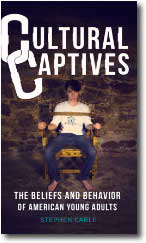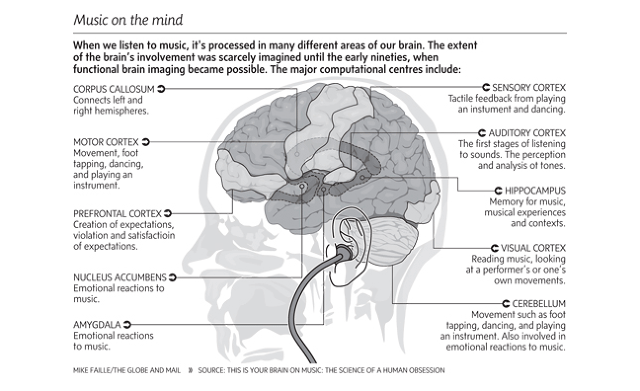“Big Data” describes the sea of digital facts, figures, products, books, music, video, and much more that we live in. Kerby Anderson calls for a biblical response of discernment and integrity.
We live in the world of “Big Data.” That is the new way people are trying to describe this sea of digital facts, figures, products, books, music, video, and much more. All of this is at our fingertips through computers and smartphones. And there is a lot of data. Eric Schmidt, executive chairman for Google, estimates that humans now create in two days the same amount of data that it took from the dawn of civilization until 2003 to create. No wonder people say we live in the world of “Big Data.”
 This remarkable change in our world has happened quickly and seamlessly. Today we take for granted that we can create data and access data instantaneously. Pick up the book The Human Face of Big Data and look at the pictures and stories that describe the powerful impact the tsunami of data is having on our lives and our world.{1} Look at how this vast amount of data is being used by individuals, universities, and companies to answer questions, pull together information, and persuade us to purchase various goods and services.
This remarkable change in our world has happened quickly and seamlessly. Today we take for granted that we can create data and access data instantaneously. Pick up the book The Human Face of Big Data and look at the pictures and stories that describe the powerful impact the tsunami of data is having on our lives and our world.{1} Look at how this vast amount of data is being used by individuals, universities, and companies to answer questions, pull together information, and persuade us to purchase various goods and services.
One article in USA Today explains how “Big Data” will transform our lives and lifestyles.{2} Retailers can target you with online purchasing appeals because of the data they already collect from you when you are online. They can suggest books, videos, and various products you would be interested in based upon previous searches or purchases.
If you have a smartphone, think of how you already depend upon it in ways that would have been unimaginable a decade ago. It can help answer a question someone poses. It can direct you to a place to eat. If you need gas for your car, it can tell you where the closest gas station is located.
“Big Data” also provides power through instant access to information. Juan Enriquez, author of As the Future Catches You, writes that “today a street stall in Mumbai can access more information, maps, statistics, academic papers, price trends, futures markets and data than a U.S. president could only a few decades ago.”{3}
Welcome to the world of “Big Data.” We have more information at our fingertips than any generation in history. As you will see, Christians need to be thinking about this change in our world. We as individuals and as a society must consider how to use all of this accumulated information wisely.
An Ocean of Data
Nearly a century ago, a dystopian novel imagined a world where every building was made of glass so that various authorities could monitor what citizens are doing every minute of the day. Dan Gardner suggests that the world of Big Data already makes that possible.{4}
The term Big Data describes the continuous accumulation and analysis of information. There is a reason people are calling it Big Data. I noted earlier that humans now create in two days the same amount of data that it took from the dawn of civilization until 2003 to create. Some predict that we will now be creating that same amount every few hours.
Dan Gardner says we are awash in an ocean of information. “Every time someone clicks on something at Amazon, it’s recorded and another drop is added to the ocean. . . . Every time a customs officer checks a passport, every time someone posts to Facebook, every time someone does a Google search—the ocean swells.”
Anyone who has access to that data can begin to use powerful computer algorithms to sift through texts, purchases, posts, photos, and videos to extract more data and trends. Gardner says it will be able to extract meaning and “sort through masses of numbers and find the hidden pattern, the unexpected correlation, the surprising connection. That ability is growing at astonishing speed.”
We actually welcome some aspect of Big Data. When I buy a book online from Amazon, it recommends other books I might want to know about and purchase. When I buy a book at Barnes and Noble, the register receipt instantaneously prints out a list of other books similar to the one I just purchased.
This ocean of Big Data is also intrusive. The government knows more about you than you might want them to know. The Internal Revenue Service is collecting more than your taxes these days. They are collecting a massive amount of personal information on your digital activities: credit card payments, e-pay transactions, eBay auctions, and Facebook posts.
Why is the Internal Revenue Service using Big Data to invade your privacy? Government leaders are putting pressure on the IRS because the federal government needs more money, and it is estimated that as much as $300 billion in revenue is lost to evasion and errors each year. Collecting and analyzing this data might be one way to close the so-called “tax gap.”
The amount of data the government and private industry collects on us each day is overwhelming. Like the fictional novel, we seem live in a world where all the buildings are made of glass.
Keeping Up With the Data
Juan Enriquez believes that we are going to have trouble keeping up with all the data coming our way. He explains the data explosion in his essay, “Reflection in a Digital Mirror.”{5} He says, “Most modern humans are now attempting to cram more data into their heads in a single day than most of our ancestors did during entire lifetimes.” He goes on to say that in the time it takes to read his essay, “the amount of information generated by the human race will have expanded by about 20 petabytes.” That is equivalent to about three times the amount of information currently in the Library of Congress.
We are trying to keep up. He estimates that we “try to cram in, read, understand, and remember at least 5 percent more words than the year before.” That essentially means that five years ago we were trying to cope with 100,000 words per day. Now we are trying to cope with 130,000 words per day.
Who can keep up? Two years ago, a global marketing intelligence firm estimated that “we played, swam, wallowed, and drowned in 1.8 zettabytes of data.” To put that in perspective, the firm used this illustration. Imagine you wanted to store this data on 32-gigabyte iPads. You would need 86 billion devices, just enough to erect a 90-foot-high wall 4,000 miles long.{6}
The good news is that we don’t have to collect, catalog, and analyze all the data. Computers with powerful algorithms can do much of it. We will benefit greatly from this tsunami of data. We will go from sampling the available data to having a collection of enormous data sets. We will know the world around us in unprecedented ways.
The explosion of digital data is also unprecedented. Juan Enriquez estimates that in 1986, only 6 percent of the world’s data was digital. The world wide web was still three years away. There was no Google or any of the services that we take for granted today. Now more than 99 percent of the world’s written words, images, music, and data are in digital form.
On the one hand, we are drowning in a sea of data. On the other hand, we have access to this data because we live in a digital world. The real question we will have to ask in the 21st century is what to do with all this data.
We will need discernment. Proverbs 3:21 admonishes us to “preserve sound judgment and discernment.” Proverbs 15:14 reminds us that a “discerning heart seeks knowledge.” Paul prayed that believers would “be able to discern what is best” (Philippians 1:9-11). We will need discernment in this age of Big Data.
Dark Data
We live in a world filled with digital facts, figures, books, music, and video. Most of it is at our fingertips, and that is a good thing. But there is also the great concern over what could be called “Dark Data.”
Marc Goodman has written about “Dark Data,” and he is concerned.{7} He has worked on security issues in more than 70 countries and sees the possibilities for criminals in our digital world.
He reminds us that criminals and terrorists have found ways to use these new devices and innovations. Sadly, we often underestimate their creativity and can easily be a step behind those who intend us harm. Sometimes they have better access to information than law enforcement and Homeland Security.
Drug-runners in Mexico not only have the latest smartphones but have actually been building their own encrypted radio networks in their country. Drug cartels in Columbia are using their vast wealth from drugs “to fund research and development programs in everything from robotics to supply chain management.”
During the terrorist attack in Mumbai five years ago, the terrorists were armed not only “with the standard artillery and explosives, but also with satellite phones, Blackberrys, night vision goggles, and satellite imagery.” If that is what terrorists had access to years ago, it is reasonable to assume that the next terrorist attack will come from terrorists using even more sophisticated technology.
One of greatest innovations for the terrorists is their open-source intelligence center, which they developed across the border in Pakistan. They were able to monitor the Internet and social media to determine the progress of their terrorist attacks. They had a real-time open-source feedback loop that gave terrorists situational awareness and tactical advantages.
One final concern about dark data is the ability to affect many more people with a crime or terrorist attack. Access to all of this data gives the bad guys an advantage unavailable to criminals in the past. Jesse James could rob a train. Bonnie and Clyde could rob a bank. A few dozens or a few hundreds would feel their impact. Today hackers can steal information from millions of people. Cybercrimes can ruin the lives of many more people, and cybercriminals may even be harder to catch.
These new technological advances and the incredible amount of data will no doubt make our world a better place. But we should also realize that criminals and terrorists will also be there to exploit it. We need to train those in law enforcement and counterterrorism in the latest technology so they can keep us safe.
Big Data and Surveillance
The TV program begins with these words: “You are being watched. The government has a secret system: a machine that spies on you every hour of every day. I know because I built it. I designed the machine to detect acts of terror, but it sees everything.”
The program I am talking about is the CBS series Person of Interest. The creator of the program, Jonathan Nolan, hit a cultural nerve about our increasing lack of privacy. In her article about the program, Susan Karlin reminds us that the storyline is fiction but based upon real-life source material that Jonathan Nolan cited in his interview with her.{8} He got some of his ideas from books like The Watchers: The Rise of America’s Surveillance State and from the government’s defunct Total Information Awareness Office.
This isn’t the first time Jonathan Nolan has raised the question of surveillance in the scripts he has written. When he co-wrote the script for the movie The Dark Knight, he inserted a scene where Batman turns all of the Gotham City cell phones into tracking devices so he can find the location of The Joker.
According to Susan Karlin, “Nolan got a taste of encroaching surveillance while growing up in the North London neighborhood of Highgate. ‘Scotland Yard began putting cameras up everywhere,’ he recalls of a time long before local phone hacking scandals erupted. ‘There were cameras out on street corners; English police employed cameras. When I moved to the States at 12, there weren’t any cameras. Now you’re seeing some cities catching up. In Manhattan, they counted 5,000 in 2005. In 2010, the number was uncountable.’” When you add all the cell phone cameras in the population to these other cameras, you can easily see we have lost our privacy.
The popularity of the television program is no doubt due to many factors, in addition to concerns about privacy and surveillance. Whatever the reasons, it has struck a nerve and caused us to once again think about Big Brother.
This topic also reminds us that we must live our lives above reproach. Philippians 2:14-15 says “Do all things without grumbling or disputing, that you may prove yourselves to be blameless and innocent, children of God above reproach in the midst of a crooked and perverse generation, among whom you appear as lights in the world.” 1 Timothy 3:2 says that an elder must be “above reproach,” which is an attribute that should describe all of us. Live a life of integrity and you won’t have to be so concerned about what may be made public in age where we are losing our privacy.
Notes
1. The Human Face of Big Data, Against All Odds Productions, 2012.
2. Chuck Raasch, “Big data transforms our lives and lifestyles, USA Today, 13 December 2012.
3. Juan Enriquez, As the Future Catches You, Crown Business, 2005.
4. “Big Data could know us better than we know ourselves,” Ottawa Citizen, April 27, 2012.
5. Human Face of Big Data, 18-21.
8. Karlin, Susan, “‘Person Of Interest’ Creator Jonathan Nolan Isn’t Paranoid—Or Is He?” Fast Company, 21 September 2011.
© 2013 Probe Ministries


 Ultimately marriage is a picture of Christ and the Church—a picture both songs catch a small glimpse of. When Trainor in “Dear Future Husband” desires (albeit via demand) for her husband to show her love by serving her and affirming her, she desires something that is biblical. Husbands are called to nourish, cherish, honor, embrace, protect, and love their wives.
Ultimately marriage is a picture of Christ and the Church—a picture both songs catch a small glimpse of. When Trainor in “Dear Future Husband” desires (albeit via demand) for her husband to show her love by serving her and affirming her, she desires something that is biblical. Husbands are called to nourish, cherish, honor, embrace, protect, and love their wives. Yet our marriage is only a picture—a flawed and imperfect picture. Husbands abuse wives, wives undermine their husbands, and spouses cheat on each other which can all lead to separation and divorce. God did not intend marriage to be plagued by sin, and divorce and pain was not in his design.
Yet our marriage is only a picture—a flawed and imperfect picture. Husbands abuse wives, wives undermine their husbands, and spouses cheat on each other which can all lead to separation and divorce. God did not intend marriage to be plagued by sin, and divorce and pain was not in his design.